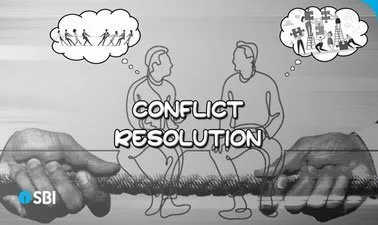
Introduction to Conflict Management 
This course introduces the fundamentals of conflict management, including its primary characteristics, sources, and consequences. You will learn core concepts and tools to better understand conflict and the various strategies to manage it efficiently. Through online learning and skill training, you will gain the knowledge and skills to become more efficient in both your private and professional life. ▼
ADVERTISEMENT
Course Feature
![]() Cost:
Cost:
Free
![]() Provider:
Provider:
Edx
![]() Certificate:
Certificate:
Paid Certification
![]() Language:
Language:
English
![]() Start Date:
Start Date:
Self paced
Course Overview
❗The content presented here is sourced directly from Edx platform. For comprehensive course details, including enrollment information, simply click on the 'Go to class' link on our website.
Updated in [May 25th, 2023]
This course, Introduction to Conflict Management, provides an overview of the essential concepts and tools to better understand and manage conflict. Participants will learn about the primary characteristics of conflict, its sources, and its consequences. Additionally, they will become familiar with the various strategies available to manage conflict efficiently. By the end of the course, participants will have a better understanding of conflict and the skills to manage it in both professional and private contexts.
[Applications]
After completing this course, participants will be able to apply the concepts and tools they have learned to better understand and manage conflicts in both professional and private contexts. They will be able to identify the sources of conflict, assess the consequences of it, and use the appropriate strategies to manage it. Furthermore, they will be able to help others with their own difficulties by applying the same concepts and tools.
[Career Paths]
1. Mediator: Mediators are professionals who help parties in dispute to reach a mutually acceptable agreement. They are trained to facilitate communication between the parties, to help them identify their interests and to develop options for resolution. Mediators are increasingly in demand in the workplace, as well as in family and community settings. The development of online mediation platforms is also creating new opportunities for mediators.
2. Conflict Resolution Consultant: Conflict resolution consultants are professionals who help organizations to manage and resolve conflicts. They are trained to assess the situation, identify the sources of conflict, and develop strategies to help the parties involved to reach a resolution. Conflict resolution consultants are in high demand in the corporate world, as well as in the public sector.
3. Conflict Coach: Conflict coaches are professionals who help individuals to better understand and manage conflicts. They are trained to help individuals to identify their interests, to develop strategies to manage conflicts, and to develop skills to better handle difficult conversations. Conflict coaching is becoming increasingly popular in the workplace, as well as in private contexts.
4. Negotiator: Negotiators are professionals who help parties in dispute to reach a mutually acceptable agreement. They are trained to facilitate communication between the parties, to help them identify their interests and to develop options for resolution. Negotiators are in high demand in the corporate world, as well as in the public sector. The development of online negotiation platforms is also creating new opportunities for negotiators.
[Education Paths]
1. Bachelor's Degree in Conflict Resolution: A Bachelor's Degree in Conflict Resolution is a great way to gain the skills and knowledge needed to become a successful conflict manager. This degree program typically covers topics such as negotiation, mediation, communication, and problem-solving. It also provides students with the opportunity to gain hands-on experience in the field. With this degree, graduates can pursue a career in conflict resolution, such as a mediator, negotiator, or consultant.
2. Master's Degree in Conflict Resolution: A Master's Degree in Conflict Resolution is a great way to further develop the skills and knowledge needed to become a successful conflict manager. This degree program typically covers topics such as negotiation, mediation, communication, and problem-solving. It also provides students with the opportunity to gain hands-on experience in the field. With this degree, graduates can pursue a career in conflict resolution, such as a mediator, negotiator, or consultant.
3. Doctorate Degree in Conflict Resolution: A Doctorate Degree in Conflict Resolution is the highest level of education available in the field. This degree program typically covers topics such as negotiation, mediation, communication, and problem-solving. It also provides students with the opportunity to gain hands-on experience in the field. With this degree, graduates can pursue a career in conflict resolution, such as a mediator, negotiator, or consultant.
4. Certificate in Conflict Resolution: A Certificate in Conflict Resolution is a great way to gain the skills and knowledge needed to become a successful conflict manager. This certificate program typically covers topics such as negotiation, mediation, communication, and problem-solving. It also provides students with the opportunity to gain hands-on experience in the field. With this certificate, graduates can pursue a career in conflict resolution, such as a mediator, negotiator, or consultant.
Course Provider

Provider Edx's Stats at AZClass
Discussion and Reviews
0.0 (Based on 0 reviews)
Explore Similar Online Courses

Evan& Guide To Forcing Moves In Chess

Healthy and safe telework

Python for Informatics: Exploring Information

Social Network Analysis

Introduction to Systematic Review and Meta-Analysis

The Analytics Edge

DCO042 - Python For Informatics

Causal Diagrams: Draw Your Assumptions Before Your Conclusions

Whole genome sequencing of bacterial genomes - tools and applications

Conflict Resolution

Mediation and Conflict Resolution


Start your review of Introduction to Conflict Management